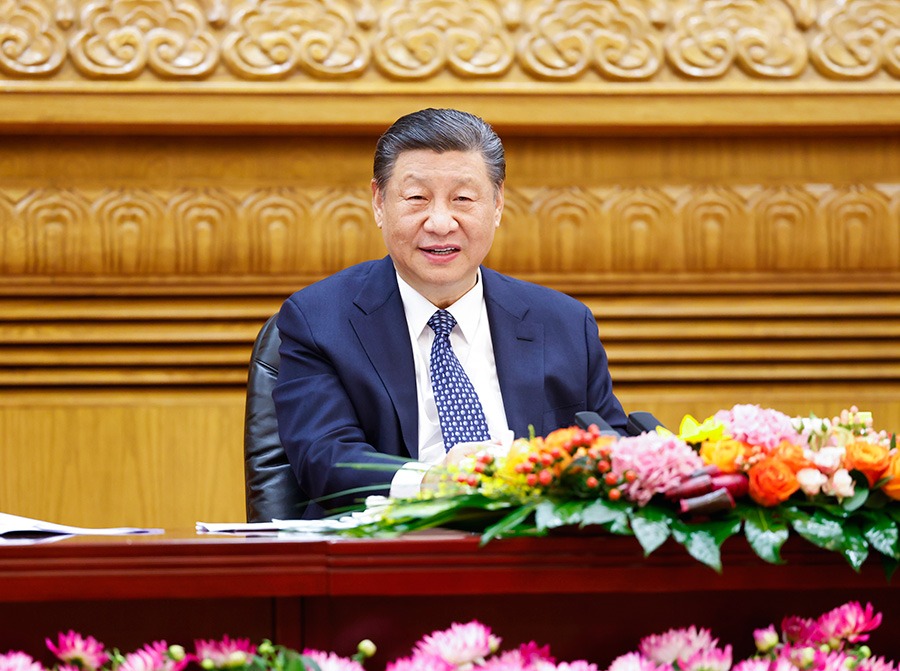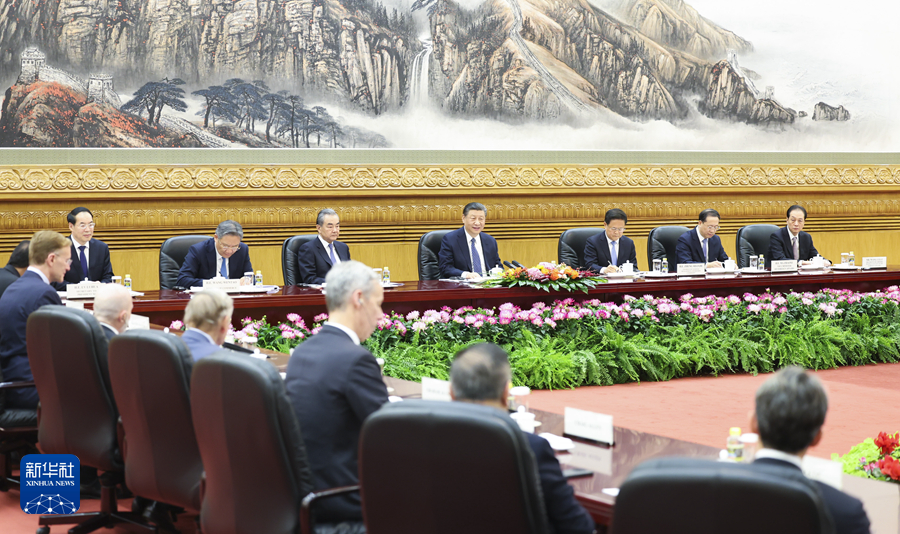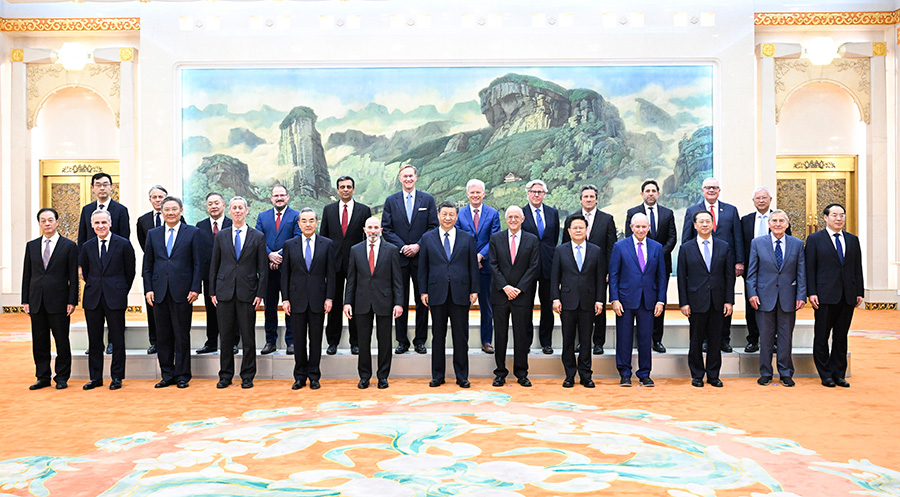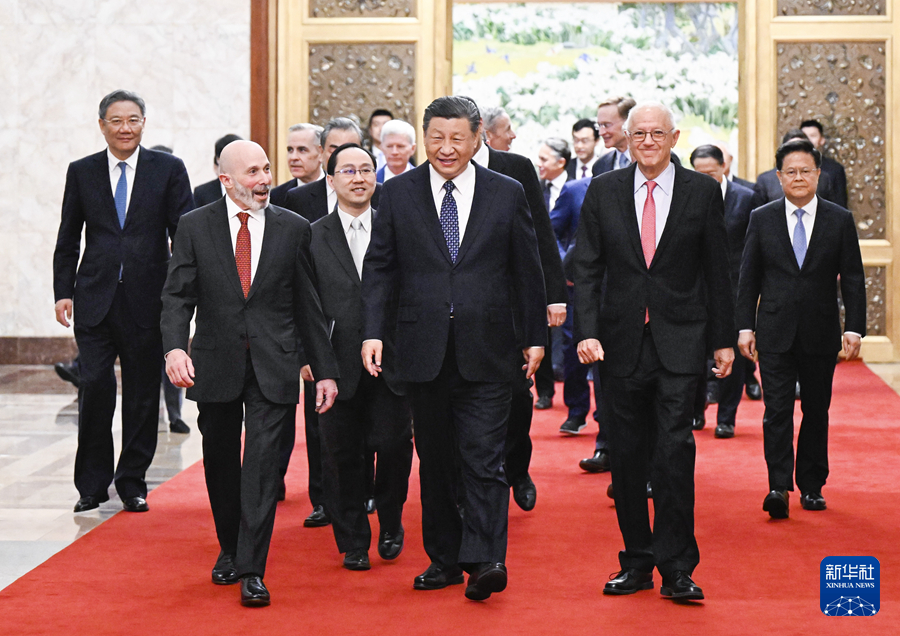On March 27th, Chinese leader Xi Jinping met with various American businessmen and academics at the Great Hall of the People in the capital, Beijing. Some guests, such as National Committee on U.S.-China Relations Board of Directors Chairman Evan Greenberg and Founding Dean of the Harvard Kennedy School of Government Graham Allision, delivered speeches to the meeting during the first part of the meeting and then “responded to their concerns one by one.”
Xi’s Comments
The Chinese leader first welcomed the visiting American businessmen and academics to China on the occasion of spring. He then began by pointing out that Sino-U.S. relations are one of the most important bilateral relations in the world. Whether China and the United States “cooperate or confront each other has a bearing on the well-being of the two people’s and the future and destiny of mankind.” Xi said that China and the United States’ respective successes are opportunities for each other as long as both sides regarding each other “as partners, respect each other, coexist peacefully, and cooperate for win-win results, China-U.S. relations will get better.”
This year marks the 45th anniversary of the establishment of diplomatic relations between China and the United States. Xi pointed out that the history of Sino-U.S. relations is a history of friendly exchanges between the two peoples; the past was written by the people, and the future must be created by the people. There is a Chinese saying, “that doing good is like ascending, doing evil is like failing.” He said that he hopes that people from all walks of life in the two countries will have more contacts and exchanges, continue to accumulate consensus, enhance trust, eliminate all kinds of interference, deepen mutually beneficial cooperation, bring more tangible benefits to the two peoples, and inject more stability into the world.

Xi first said that China’s economy is “healthy and sustainable” and then pointed out that the country’s economic growth rate is “ranked among the best among the world’s major economies.” He also said that China’s contribution to global economic growth “continued to exceed 30 percent.” This achievement was made by the Chinese people and cannot be separated from international cooperation. Xi said that China’s development has gone through “various difficulties and challenges” that got the country to where it is today. The Chinese economy did not collapse due to the “China Collapse Theory” in the past, and it will not peak due to the “China Peak Theory” now. Xi then said the Chinese government will continue to promote high quality development and Chinese-style modernization to enable the Chinese people to live a better life and make greater contributions to the sustainable development of the world. He then said that the country’s development prospects “are bright, and we have the confidence and strength to do so.”
According to Xi, he said many times that reform and opening up is an important magic weapon for contemporary China to make great strides to catch up with the times. Xi said that “China’s reform will not stop and its opening up will not stop.” The country is planning and implementing “a series of major measures” to comprehensively deepen reforms, continue to build a market-oriented, legal, and international first-class business environment. China will also provide broader development space for enterprises from all over the world, including American enterprises.
Xi said that “in the face of the new situations and changes in China-U.S. economic and trade relations in recent years, both sides must “adhere to mutual respect, mutual benefit, equal consultation, and act in accordance with economic laws and market rules.” The relations between both countries must expand and deepen mutually beneficial economic and trade cooperation, respect each other’s right to development, and pursue a win-win situation for China and the U.S. as well as for the world. Xi then says that China welcomes “U.S. companies to participate more in the construction of the Belt and Road Initiative, to take part in large-scale economic and trade activities such as the China International Import Expo, and to continue to invest in China, deepen their cultivation in China, and win in China.

He then said that in recent years, Sino-U.S. relations have experienced “many twists and turns and encountered severe challenges,” and the lessons are worth learning. The relations between China and the United States cannot return to the past, but they can have a better future. Xi then talked about when he and U.S. President Biden met in San Francisco last year and how the “biggest consensus” was that Sino-U.S. relations should be stabilized and improved. In the past few months, the teams of both sides have maintained communication and made progress in various fields such as politics and diplomacy, economy, trade and finance, law enforcement and anti-drugs, climate change, and people-to-people and cultural exchanges based on the consensus reached by President Biden and me. Xi then pointed out that under the current situation, the common interests between China and the United States “have not decreased, but have increased.”
Xi then said that whether it is traditional fields such as the economy, trade and agriculture, or emerging fields such as climate change and artificial intelligence, China and the United States should be a boost to each other’s development rather than a hindrance. Promoting world economic recovery and resolving international and regional hotspot issues “require coordination and cooperation between China and the United States, showing the broad mind and responsibility of a major country.” He then said that the United States should work with China halfway, establish a correct strategic understanding, properly handle sensitive issues, and maintain the momentum of stabilizing Sino-U.S. relations. Furthermore, Xi also said that the United States and China should actively explore the right way to get along, and promote the sustained, stable, and healthy development of Sino-U.S. relations.

In their speeches, Allen and the U.S. businessmen and academics thanked Xi for taking the time to meet with them. They said that over the past few decades, China has achieved extraordinary economic growth and transformation, demonstrating strong resilience and vitality. Furthermore, “under the outstanding leadership of President Xi Jinping, China is committed to developing new productive forces and achieving more sustainable and high-quality development.” The Chinese people’s right to development should be respected. It is believed that China will achieve its own development goals and promote world economic development and integration. They then said that a strong and prosperous China is a positive energy for the world.
One of the speeches mentions that “economic relations between the United States and China are closely interdependent. Allison said that “peaceful coexistence can the two countries achieve development and prosperity” and that the ‘Thucydides Trap’ is not inevitable.” U.S. companies appreciate China’s recent series of important measures to further reform and open up. They are optimistic about China’s economic development prospects and will unswervingly continue to work in China and develop a long-term and close cooperative relationship with China.
Another speech mentioned that the successful meeting between Xi and President Biden in San Francisco last November “boosted expectations and confidence in the future of U.S.-China relations from all walks of life in the United States and around the world.” Furthermore, the U.S. business community and strategic academia support the United States and China in strengthening exchanges at all levels, enhancing mutual understanding, trust, and cooperation. The groups also support both countries working together to address global challenges and promoting the establishment of a stable, sustainable, and productive U.S.-China relationship.
Analysis
The meeting between Xi and the various U.S. businessmen was meant to assuage their concerns about China’s economy and to show them the country is open for investment. Furthermore, Xi used the meeting to show that the relationship between China and the United States is stabilizing and that any geopolitical tensions are the result of U.S. actions. However, the meeting reportedly did little to show the group that Xi will move China in a different direction than its current trajectory. For example, Xi mentioned that the country’s economy is healthy and sustainable, and its economic growth is among the highest in the world.
He did not mention, however, the various economic crises and issues, such as the real estate and shadow banking crises and the lack of consumer confidence, that are negatively affecting the Chinese economy. More importantly, Xi did not provide any details regarding how China would solve the crises that would alleviate the CEO’s concerns about the Chinese economy. His comments also lacked any mention of whether China will continue to use various laws, such as the counterespionage and protecting state secrets laws, to label information market data as state or work secrets, another key concern for American businesses.
While Xi talked about the geopolitical tensions between China and the United States, he talked about the relationship that should be based on peaceful coexistence and win-win results. He framed the Sino-U.S. relationship in this way due to his belief that the United States’ actions, such as export controls on semiconductors, are meant to stop the country’s rise. Furthermore, Xi also believes that the economic and trade relationship between the countries has changed significantly to the point that China’s economy will become bigger than that of the United States. He posited that the United States should instead invest in country’s development, which would enable both countries to continue their ‘win-win’ relationship.
Xi views the U.S. businesses invited to the meeting as important in reducing the tensions between the two countries and restarting investment in China by forcing the United States to concede on several economic and trade issues. For example, his comments about U.S. businesses being welcome to increase their cooperation in the BRI and other economic and trade initiatives were meant to entice the businesses into increasing their China-based operations. However, China’s industrial overcapacity, Taiwan, and the United States’ emphasis on reducing the risks of their exposure to Chinese markets and supply chains will likely be too significant for both countries to overcome. The companies are also wary of increasing their operations and exposure to Chinese markets and supply chains because of the geopolitical tensions as well as the increasingly chilling business environment.

